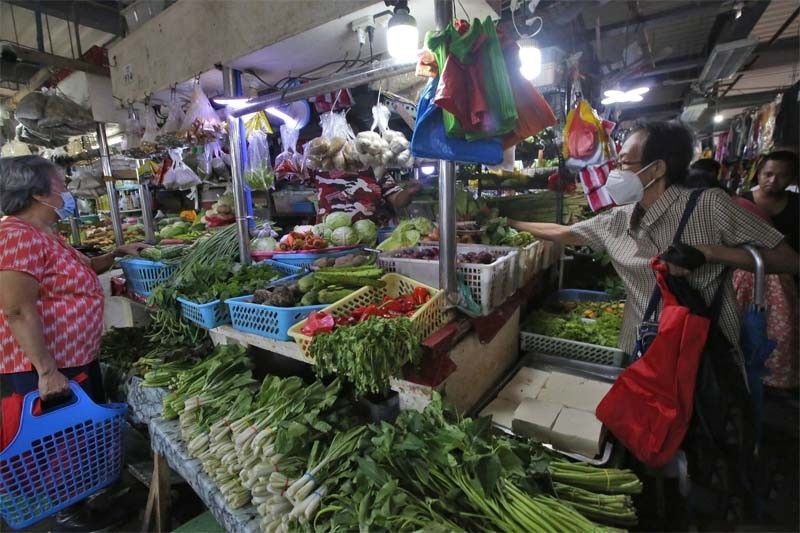Inflation likely cooled in October

Economists’ poll
MANILA, Philippines — Economists are anticipating a slowdown in the price hikes of essential goods and services for the month of October following two consecutive months of acceleration, which saw prices rise by 5.3 percent in August and 6.1 percent in September.
Security Bank chief economist Robert Dan Roces said inflation eased to 5.4 percent last month, primarily driven by persistently high food prices but partially offset by a decline in oil costs.
He said latest data showed some easing in the cost of essential food items such as rice, meat, and vegetables as well as reductions in electricity and pump prices in October.
“While these factors could alleviate inflationary pressures, they may not be substantial enough to warrant diminished vigilance from the central bank given upside risks,” Roces said.
The BSP’s Monetary Board delivered a 25-basis point off-cycle hike last Oct. 26 to prevent supply-side price pressures from inducing additional second-round effects and further dislodging inflation expectations.
The central bank has raised key policy rates by 450 basis points since May last year to tame inflation and stabilize the peso that slumped to an all-time low of 59 to $1 in October last year.
Despite maintaining a hawkish pause between May and September this year, the benchmark interest rate currently stands at a 16-year high of 6.50 percent, the highest since the 7.50 percent in May 2007.
China Bank chief economist Domini Velasquez said inflation slowed to 5.4 percent last month, driven by lower prices of key food items such as rice, meat and vegetables as well as declines in domestic fuel prices.
“We anticipate inflation to slow for the remainder of the year barring new shocks. Easing price pressures could hold off additional rate hikes from the BSP,” Velasquez said.
She added that inflation would settle within the BSP target range in the first quarter of next year but is expected to breach the upper end of the target for a few months through July due to base effects.
ING Bank senior economist Nicholas Mapa also believes inflation eased to 5.4 percent in October from 6.1 percent in September.
Michael Ricafort, chief economist at Rizal Commercial Banking Corp., said inflation slowed to 5.6 percent in October from 6.1 percent in September. This slowdown was primarily due to higher base effects from a year ago, which mathematically leads to slower year-on-year headline inflation starting in the fourth quarter of this year.
“Relatively better weather conditions so far in October 2023 compared to some storm damage from late July to September 2023 could have helped stabilize food prices, such as vegetables and other agricultural products; since food accounts for more than one-third of the inflation basket,” Ricafort said.
Ricafort added that palay harvest season from mid September to October that increased local palay and rice supply also helped stabilize or even ease local palay prices, which accounted for nearly nine percent of the consumer price index (CPI) basket.
According to Ricafort, the peso exchange rate has been relatively stable last month at 56 levels, thereby could also help stabilize import costs and overall inflation.
Likewise, the economist said global crude oil prices remained relatively stable, at $82 per barrel in October from around $95.03 last Sept. 28.
DBS Bank senior economist Radhika Rao said inflation in October slowed to 5.7 percent.
“Base effects are expected to see inflation ease modestly from 6.1 percent in September to 5.7 percent year-on-year in October, with a steady pace of month-on-month rise,” Rao said.
Rao pointed out that the decision of the government to temporarily raise domestic jeepney fares in early October added to sequential pressures.
“Even as BSP expressed caution over growth, pipeline inflation risks by way of minimum wage increases, higher utilities and transport fares, a weak peso pose imported price pressures, which will keep the BSP hawkish in the final quarter of the year,” Rao said.
On the other hand, Philippine National Bank economist Alvin Arogo said inflation remained elevated at 6.1 percent last month, mainly due to higher jeepney fares and minimum wage.
“Meanwhile, our baseline estimates show that due to persistent supply issues and second-round effects, inflation might continue to be above the four percent mark until 3Q24,” Arogo said.
The Lucio Tan-led bank believes that the BSP is done with the rate hikes.
“However, there is considerable risk that rates will be raised anew in case inflation data is worse than expected,” Arogo said.
Inflation averaged 6.6 percent from January to September this year, well above the BSP’s two to four percent target range. Headline inflation eased for six straight months to 4.7 percent in July from a peak of 8.7 percent last January but accelerated in August and September.
The BSP earlier said inflation likely settled within the range of 5.1 to 5.9 percent in October as lower prices of rice, meat, and vegetables along with the reduction in the prices of petroleum products contributed to downward price pressures.
On the other hand, the central bank said higher prices of electricity, LPG, fruits, and fish, as well as the recent adjustment in jeepney fares were the primary sources of upward price pressures last month.
- Latest
- Trending































